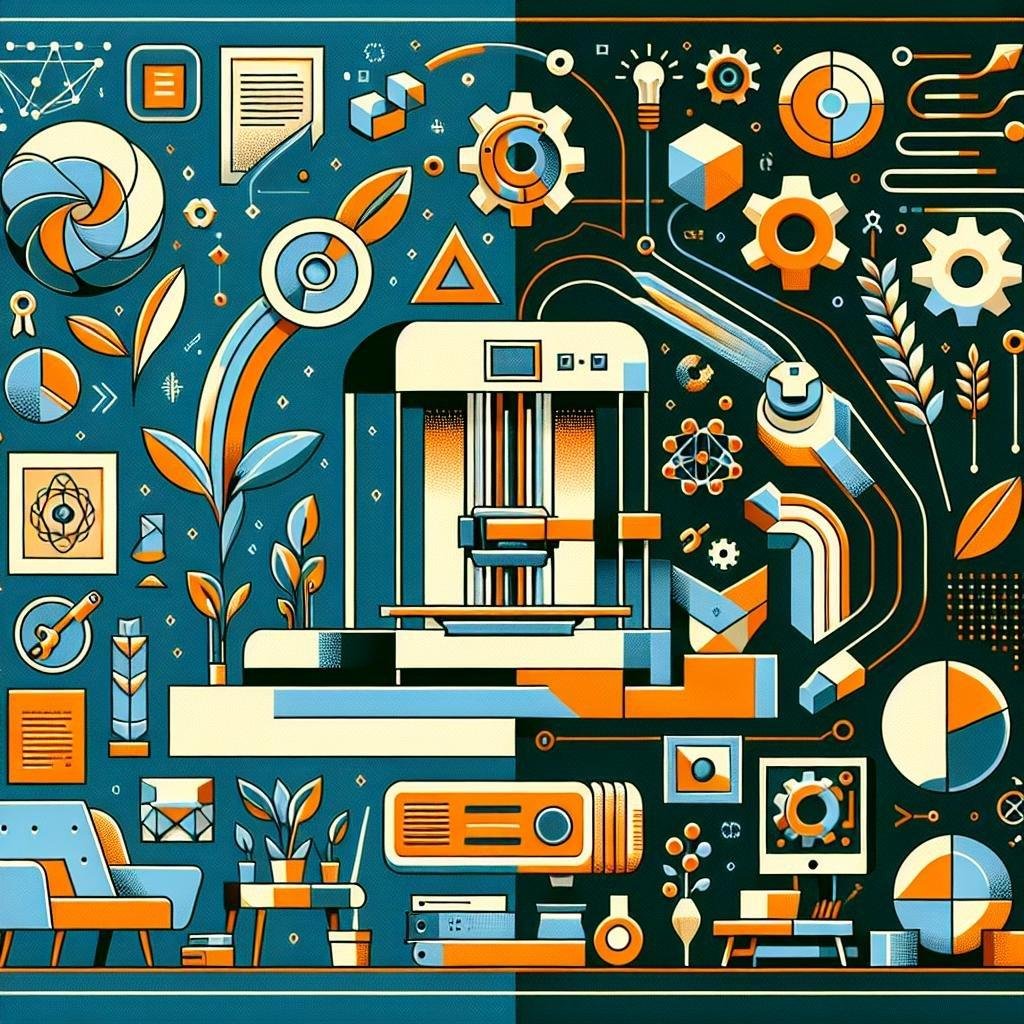in the ever-evolving world of 3D printing, where imagination is only limited by one’s creativity and design prowess, having the right software can be the ultimate game-changer.whether you’re a curious newcomer just dipping your toes into the mesmerizing realm of 3D printing or a seasoned enthusiast aiming to refine your craft, equipping yourself with the right digital tools is essential. navigating through the myriad of software options can be daunting, but fear not, fellow creator! We’re here to guide you through the must-have software that will elevate your 3D printing journey from ordinary to remarkable. From intuitive design platforms to slicing software that optimizes every print,we’ll explore the tools that will keep your imagination soaring and your creations top-notch. So, buckle up and get ready to enhance your digital toolkit with the essentials every 3D printing aficionado should have at their fingertips!
Exploring the Digital Toolbox essential Software for Every 3D Print visionary
Stepping into the world of 3D printing can feel like diving into a boundless ocean of chance, and having the right tools in your digital toolbox is essential for turning creative visions into reality.There is a range of software that can empower any enthusiast in this vibrant field. Slicing software, for instance, is a staple necessity—it converts digital 3D models into instructions for the printer, effectively bridging the gap between idea and execution. Opt for programs like Cura or PrusaSlicer, which offer user-friendly interfaces and a wealth of customization options. For those who are more inclined towards intricate designs, CAD software such as Fusion 360 or TinkerCAD allows for precision-based creativity by providing a robust array of modeling tools. The key is to find a balance between the complexity of features and the ease of learning curve that suits your style.
Meanwhile,optimal post-production processes are made achievable by programs like Meshmixer and Blender. These are invaluable for any visionary aiming to refine prints, repair model issues, or add that last touch of creativity to their designs. For a comprehensive digital toolbox, consider leveraging software that supports 3D scanning. Utilizing programs such as ReMake enhances the ability to convert real-world objects into digital meshes. Here is a speedy comparison of some essential software features to guide your selection:
| Software | Best for | Key Feature |
|---|---|---|
| Cura | Slicing | Custom Profiles |
| Fusion 360 | CAD Design | Parametric Modeling |
| Meshmixer | Model Refinement | Mesh Repair |
| ReMake | 3D Scanning | Photogrammetry |
With these essentials, every 3D print enthusiast can not only harness the power of digital creation but also enjoy the seamless journey from conception to tangible artifact.

From Design to Reality Navigating the best 3D Modeling Programs
Embarking on the journey from imagination to tangible object is an exhilarating adventure for any 3D printing enthusiast, and selecting the right software is akin to choosing the perfect set of brushes for a masterpiece. With a myriad of options available, identifying the program that best suits your needs can be confusing. Fortunately, there are several essential features to look for in a 3D modeling program that can drastically enhance the creation process. Some key attributes to prioritize include a user-friendly interface, customizable toolsets, and compatibility with multiple file types. For those just diving into the world of 3D printing, beginner-friendly options like Tinkercad, which offers a simple drag-and-drop approach, or Fusion 360, renowned for its comprehensive suite of tools and collaborative features, come highly recommended.
For the more seasoned creators, advanced programs such as Blender and SolidWorks offer unparalleled depth and precision in modeling capabilities. These platforms are celebrated for their intricate detail management and extended support for complex designs. Furthermore, users interested in bridging the gap between technical precision and artistic flair often find ZBrush invaluable, with its proficient sculpting tools. As the landscape of 3D modeling software evolves,it’s crucial to evaluate each option’s strengths and match them against your project requirements. Below is a quick comparison table to help visualize some of these key features:
| Software | Ideal For | Key Feature |
|---|---|---|
| Tinkercad | beginners | Drag-and-Drop |
| Fusion 360 | Collaborative Design | Comprehensive Toolset |
| Blender | Advanced Modeling | Detail Management |
| ZBrush | Artistic Sculpting | Sculpting Tools |

Mastering Slicing Software Crafting Precision in Every Layer
Diving into the world of 3D printing opens a realm where imagination meets engineering. Slicing software,often an unsung hero,acts as the conduit between your digital design and the physical masterpiece.by converting intricate 3D models into precise instructions for the printer, slicing software ensures that each layer is meticulously crafted. Wondering which slicing software can enhance your 3D printing adventures? Whether you’re after intuitive interfaces or crave unparalleled customization, these tools have been hailed as essentials by enthusiasts and experts alike.
- Cura: Known for its user-friendly interface, Cura is ideal for beginners yet powerful enough for veterans. Its open-source nature invites a community of dedicated developers, continuously enriching the features.
- PrusaSlicer: Created by Prusa Research, this software brims with advanced settings and intricate controls. Perfect for tech-savvy users who want to tweak every variable to perfection.
- Simplify3D: Although it demands a premium, Simplify3D is revered for enhanced precision and faster slicing times. Tailor your prints with its robust control features ensuring top-notch quality.
| Slicing Software | Best Feature |
|---|---|
| Cura | Open-source flexibility |
| PrusaSlicer | Advanced customization |
| Simplify3D | Professional precision |
Choosing the right tool is akin to selecting a partner for your 3D printing journey—one that complements your creativity while elevating the quality of each print. Delve into these options and find the perfect match that aligns with your vision and project needs.

enhancing Creations with Post-Processing Tools the Final Touch fá凡
Once your 3D print has transitioned from digital design to physical reality, the art of refinement begins.Post-processing tools are the secret ingredients for breathing life into your prints, offering that professional, polished edge. Whether you need to sand, paint, or apply intricate details, there’s a range of software that can transform your creation into a final masterpiece. Meshmixer stands out with its fantastic capabilities in remeshing and sculpting, while Blender provides a powerful suite of tools for not only post-processing but also creating complex textures and animations. Through intuitive interfaces, these tools enable artists to smooth surfaces, enhance structural integrity, and add custom detailing. Embrace these virtual artisans to finish your projects with finesse!
For those delving deeper, understanding which tools complement different printing materials can be essential.Here’s a snapshot to guide your choice:
| Material | Recommended Post-Processing Tool |
|---|---|
| PLA | Meshmixer for surface smoothing |
| ABS | Blender for intricate detailing |
| Resin | ZBrush for texturing |
One tip stands worldwide: always keep a toolbox of varied software ready, as each project may demand a different technique or finish. These innovations in post-processing lend versatility to your creations,allowing you to push boundaries further and craft prints that are not only functional but also captivating.
Q&A
Q&A: Must-have Software for 3D Printing Enthusiasts
Q: Why is software so crucial for 3D printing enthusiasts?
A: Imagine you’re a budding sculptor, clay in hand but no tools to shape it. Software for 3D printing acts like these essential tools, transforming digital designs into printable realities. It’s the bridge between imagination and materialization!
Q: What is slicing software and why is it a must-have?
A: Slicing software is like your 3D file’s personal tailor. It cuts your model into thin, printable layers and programs how each layer is printed. Without it, your printer wouldn’t know where to start—and your masterpiece would be nothing more than a digital daydream.
Q: Can you recommend a popular slicing software?
A: Absolutely! Cura,developed by Ultimaker,is a fan favorite. It’s user-friendly, regularly updated, and supports a wide range of 3D printers. think of it as your digital sidekick—always ready to help your designs come to life!
Q: What role does CAD software play in 3D printing?
A: CAD software is the sketchbook for your 3D artistry. It lets you create, modify, and perfect your models before they become tangible objects. With powerful CAD tools, you can draw your wildest creations straight from your imagination.
Q: Which CAD software is great for beginners?
A: Tinkercad is a fantastic starting point. Designed with simplicity in mind, it’s perfect for beginners eager to dive into the world of 3D design. Its intuitive interface makes learning feel like play—ideal for unleashing creativity without overwhelm.
Q: Are there any essential tools for repairing and optimizing models?
A: Definitely! Meshmixer is your go-to for fixing and refining 3D models. It can repair holes, smooth surfaces, and even sculpt enhancements. Picture it as a digital spa, where your models go to get polished and primed for printing success.
Q: How about software for checking printability?
A: Netfabb Basic is a superb choice. It’s like giving your model a thorough check-up before going under the printer’s nozzle. With tools to analyze and repair potential print issues, it ensures your print turns out as splendid as planned.
Q: is there a software that allows sharing and discovering new designs?
A: Thingiverse is a vibrant platform for sharing and discovering models. It’s akin to a bustling digital marketplace, brimming with creative treasures from makers worldwide. Perfect for when you need inspiration or wish to showcase your designs.
Q: How does software contribute to improving printing efficiency?
A: Software enables precision and optimization by adjusting settings like speed, infill, and supports. This fine-tuning ensures faster printing times and minimized material wastage—maximizing joy while conserving resources!
Q: Any last tips for 3D printing enthusiasts on software?
A: Explore, experiment, and don’t be afraid to dive into tutorials or forums. The right combination of software tools can turn any curious beginner into a seasoned creator, ready to fill the world with innovative prints.Happy printing!
Concluding Remarks
As we wrap up our exploration of must-have software for 3D printing enthusiasts, it’s clear that the digital realm is as crucial as the physical in bringing creations to life. Whether you’re fine-tuning designs with precision or experimenting with cutting-edge features, these software solutions are your trusty companions on the journey from imagination to tangible perfection.So, fire up your computer, let the virtual world of 3D possibilities inspire you, and remember: in the vibrant nexus where art meets technology, your only limitation is your creativity. Happy printing, fellow innovators!

